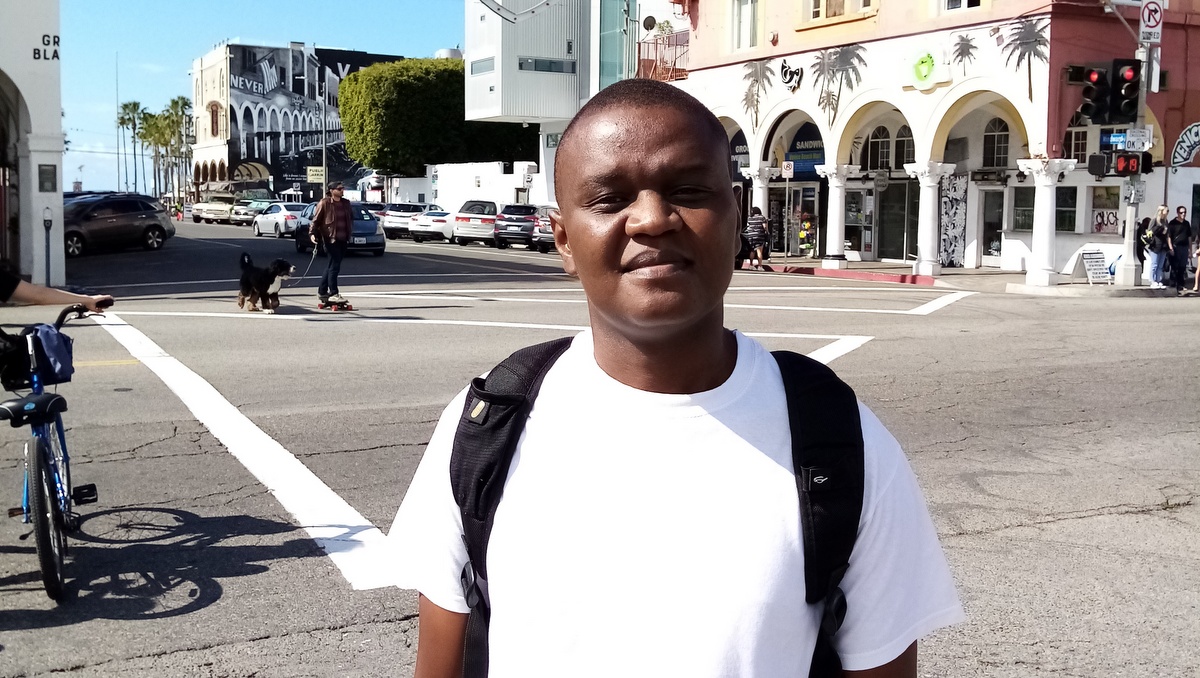
Sibusiso Khuzwayo is the writer and director of The Letter Reader a story of a 12-year-old boy sent to a village. The Letter Reader has generated interesting reviews, but my favorite is by John Kani (Black Panther). He says, the film is indeed a beautiful film, it is truly an African story. Sibusiso Khuzwayo’s film won multiple awards for Best Short, and today he talks to us about his internal journey to create his debut film. Great to meet you Sibusiso!
indieactivity : How do you choose a project to direct?
Sibusiso Khuzwayo (SK): Great to be here! Ideally I would prefer to only direct the project that I write because in that way you get to work on the projects that deal with issues and themes that you deeply care about. So if I were to be presented with an opportunity of directing a project that I didn’t write, I would have to see if I connect with the issues and themes that the project addresses.
Why filmmaking and screenwriting? Why did you get into it?
Sibusiso Khuzwayo (SK): Besides the privilege of potentially sharing your stories with the world, filmmaking allows us to express our view of the world. Initially I just wanted to be a director and I was never interested in becoming a screenwriter, but the challenge is that it is not easy for people to trust you with a script when you don’t have a track record. I wrote my first short film script as a way of creating something that will give me an opportunity to direct. And writing the script not only made me appreciate the process of screenwriting but I fell in love with it.
The Letter Reader Official Trailer directed by Sibusiso Khuzwayo and produced by Cati Weinek
How can a filmmaker, if she so chooses, distribute her film? How do you get it in front of an audience?
Sibusiso Khuzwayo (SK): Just like many aspiring filmmaker dedicate time and resources to learning about directing or writing, a lot also needs to go into learning about distribution. I believe that there are many great films that we never get to see because of bad distribution strategy. So the filmmaker would need to learn and research about distribution to be able to come up with a solid strategy. Another option would be to collaborate with people that are experts in distribution. The reality is that, creating a film takes so much from the filmmaker and by the time you get to distribution stage you are exhausted. An advantage of collaborating also allows you to focus on your next project while your collaborators handle the distribution.
Is there anything about the making of independent film business you still struggle with?
SK: Funding was the biggest challenge I faced. The sad truth is that in South Africa it is still a struggle for films to make profits and that makes businesses reluctant to invest because they consider films as high-risk business. So we end up relying mostly on grants to make films and there is only so much the government can do. So it becomes difficult to raise funding when there are thousands of us queuing for the funding.
Talk to us about your concept on collaboration?
SK: As an African person that subscribes to the African philosophy of ‘Ubuntu’, collaboration is a big part of me. Ubuntu is essentially about togetherness and I believe that film creation provides a good context for different people to come together to create magic. Having said that, it is important to have the same vision and passion with the people that you collaborate with.
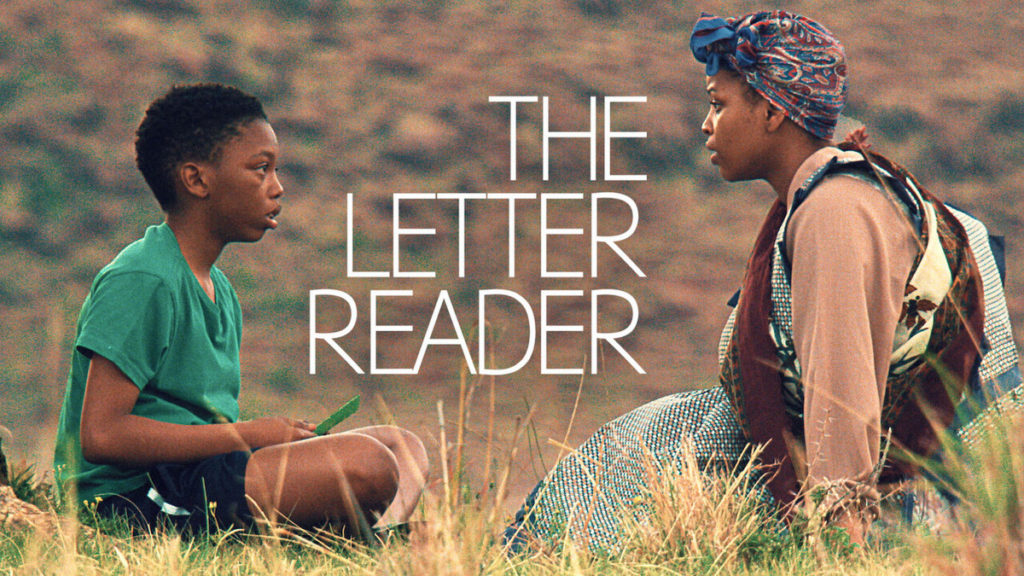
What uniqueness do female directors/filmmakers bring to film/TV/cinema?
SK: I believe that because women are naturally nurturers, they bring a unique sensibility and warmth to the work. The work of directors like Ava Duvernay, Julie Taymor, Shonda Rhimes, Sofia Coppola and many others give the viewer a unique experience that one can’t help but marvel at the richness, boldness and gentleness of their work.
When you are offered a project, what things do you put in place to deliver a good job?
SK: The first thing I would do if I were offered a project would be to immerse myself in the story or script. I believe that as a director, before you even think about actors, crew, locations and cameras, it is important that you ensure that the script is in a good place. In the words of the great Japanese auteur director Akira Kusosawa, “With a good script, a good director can produce a masterpiece. With the same script, a mediocre director can produce a passable film. But with a bad script even a good director can’t possibly make a good film.” So to deliver a good job I would need to be confident that the script is solid. And once that is done, then I would surround myself with people that are best for the job.
How do you find the process of filmmaking as an indie filmmaker?
SK: I find it fulfilling because you acquire a whole lot of skills and you have a bird-eye-view of the whole process. By the time the film comes out you are like a wounded soldier from war, but you get so much fulfilment when the audience appreciate your work.
Why would you choose an actor, writer or producer? What do you look for?
SK: I would look for someone that will elevate the work. In terms of choosing an actor, I would choose an actor that surprises me by taking the material to a higher level and gives me new insight into the character.
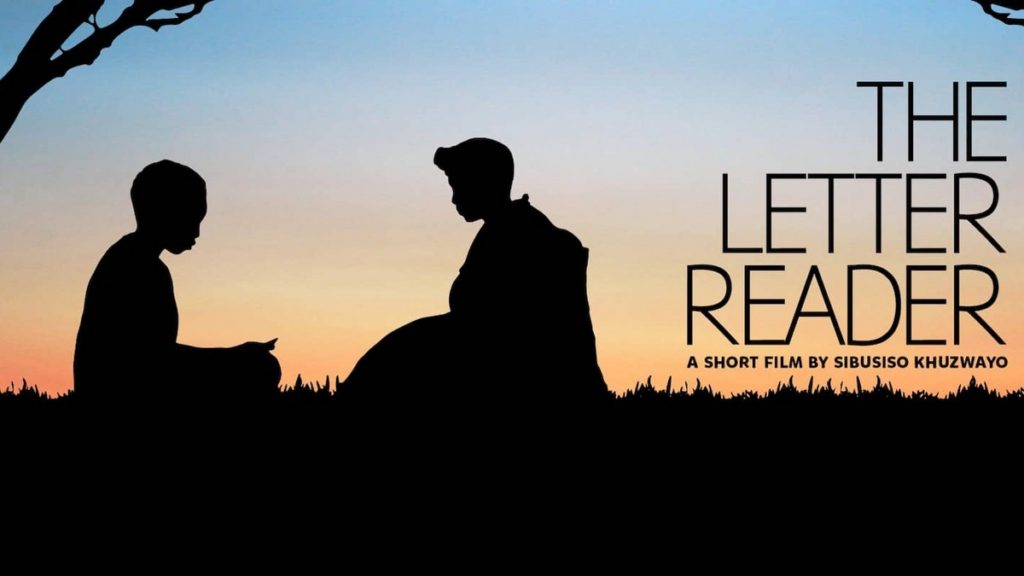
At what period in the filmmaking process, do you need to start planning for distribution?
SK: I think it’s good to start thinking about distribution while you are still in development stage because that forces one to think about the target audience and how you want to reach them. It’s not a good thing to start planning for distribution once you’ve completed the film because in the rush of trying to get it out there, it is easy to make mistakes. By the same token I believe for the film to be authentic and powerful, the filmmaker should just focus on writing what feels true to them and not worry about distribution. As suggested in some of his interviews, one can tell that Korean director, Bong Joon-ho was not thinking much about distribution when he wrote the script of his academy award winning film, ‘Parasite’.
How do you think filmmakers can finance their projects?
SK: There are many ways a filmmaker can finance a project and sometimes it’s a combination of different methods. For a filmmaker that is working, it is good to start putting away money for your project because sometimes when you ask for assistance people would ask how you much you have. When I was LA to showcase my short film as part of the YouTube and African Narrative initiative, we met a female Uber driver who shared her story with us. The woman is an indie filmmaker and she works as an Uber driver to raise finance for her film project. Her story really inspired me. I have also seen filmmakers running crowd funding campaigns to finance their projects. And then of course there are institutions where one can apply for funding. So there are many ways to use and it always boils down to how much you need for your film.
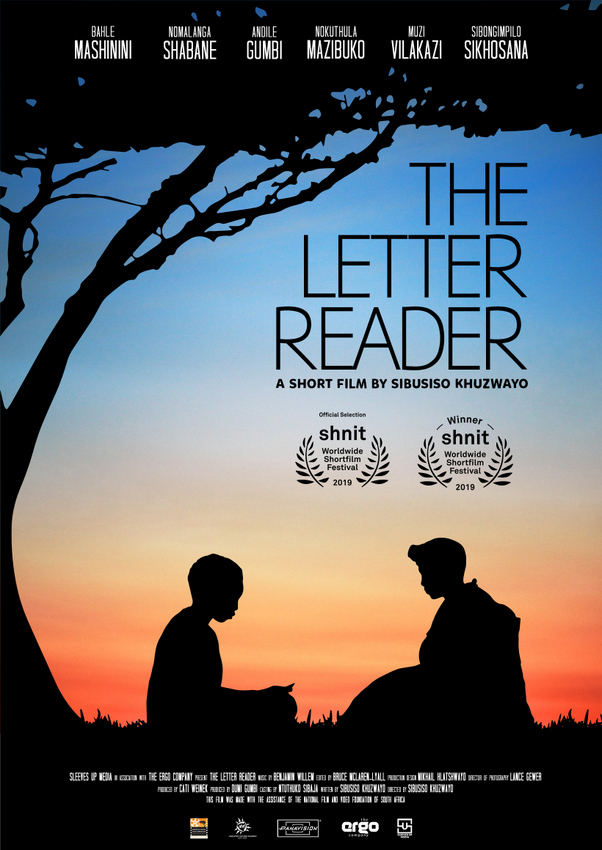
Describe your most recent work, or film?
SK: The name of my short film is called ‘The Letter Reader’, a story about a 12-year-old boy who reads letters for the villagers and his life changes when he has to read a heart-breaking letter to a young beautiful woman. As an inexperienced filmmaker it was important for me to work with reputable producers to bring this story to life. I worked Catharina Weinek and Dumi Gumbi who have acclaimed films under their names. They leveraged their relationships in the film industry to put together an experienced crew. A key aspect in turning your words into visuals is the collaboration you have with the director of photography and production designer. I was blessed to work with Lance Gewer, an acclaimed DP that shot the academy award winning South African film, ‘Tsotsi’. It doesn’t get better than that! And for production design I had Mikhail Hlatshwayo, an experienced PD who always goes an extra mile to give the film a distinct look. All the crew members displayed sheer dedication to the project and experienced as they are, they showed hunger that is usually seen in aspiring or budding filmmakers. We were also blessed with an amazing cast that includes Bahle Mashinini, Nomalanga Shabane, the late Andile Gumbi and Nokuthula Mazibuko. After completing the script, it took me 3 years to make the film and we shot it in 3 days. Bruce MacLaren Lyall edited the film, Basiami Segola did the sound design, and Benjamin Willem and Vuyo Manyike did the music.
What is your experience working on the story, the screenplay, the production, premiere and the marketing?
SK: The most enjoyable experience I had in the whole process was writing the script. It was such an exhilarating experience that felt like walking on a land where you constantly discover precious gems along the walk. Everytime I sat down to think or write about the story I would constantly discover new things about the story and the characters. It was amazing that I would feel each emotion that the characters in the story were feeling. It’s tempting to stay in that world but at some point you need to get out of it to think about the practicalities of turning that story into a reality. After finishing the script, it took 3 years or so to get into production. It was a long journey that I feel was more spiritual than physical. I faced so many obstacles to a point where I nearly gave up because I had exhausted all avenues that would make the film happen. It’s true when they say, when you run out of strength and you are at wits’ end God steps in. It’s that moment where you come to the full realization that you need a power that is bigger than you to intervene. And when things started to happen, I was just in awe at the rate at which they were happening. So I say it was a spiritual journey because I saw the power of God at work to make The Letter Reader happen. The film was funded by the Kwazulu-Natal Film Commission and National Film and Video Foundation, and Panavision SA and Panalux supplied us with gear. The film premiered at the Shnit Worldwide Short Film Festival in Cape Town, where it won the Made in South Africa Jury Award. Marketing and distributing the film was a challenge at first until Indigenous Film Distribution came on board.
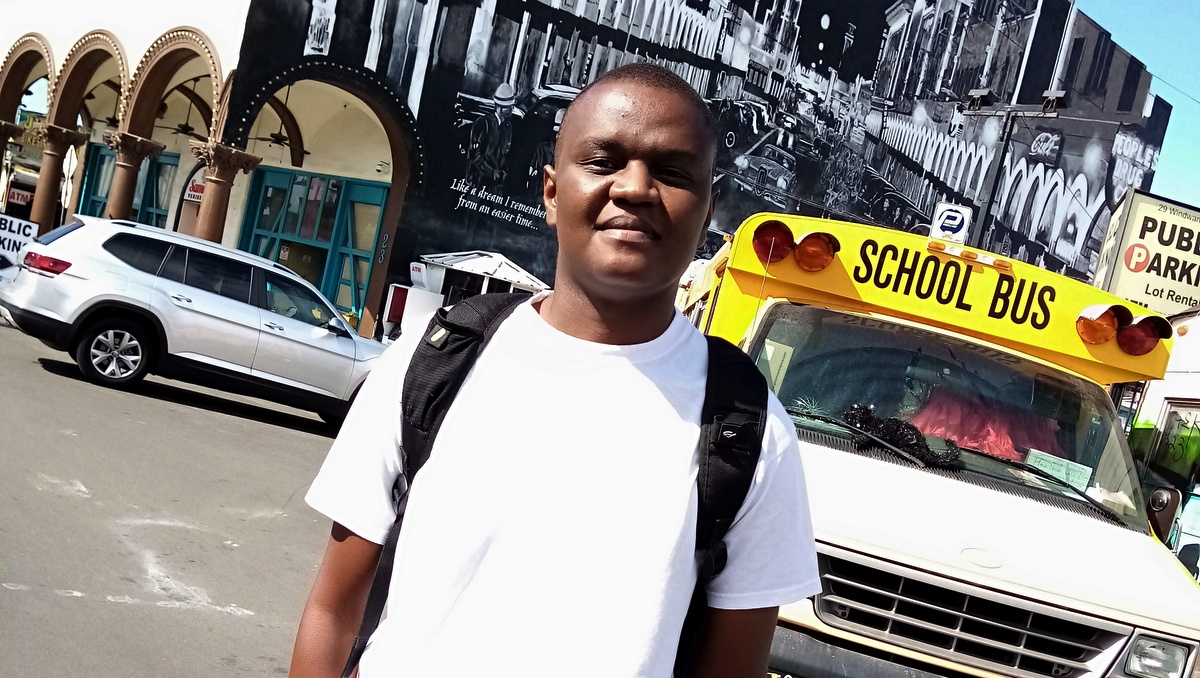
How did you put the crew and cast together? Did you start writing with a known cast? What was your rehearsal process and period?
SK: I relied on the producers to put together a crew because my knowledge of the film industry was limited. In terms of the cast, we ran auditions in Johannesburg and Durban. The budget we had couldn’t afford us the luxury of rehearsals. So we knew that we needed to cast right and put our faith on the actors to deliver on the day of the shoot. The only actor that I rehearsed with was Bahle Mashini who plays the 12-year-old boy, Siya. This was a very important character that holds the story together and I felt that we needed to be confident that the young actor could carry the story. And the most challenging thing with the script is that it had limited dialogue but so much subtext. So it was important for the actor to express the emotions and thoughts without saying a word. So our rehearsal was mainly about calibrating and nuancing each moment to make it more impactful. And I must say Bahle is such a talented young actor who always surprises you with his choices as he performs.
What and how long did it take to complete the script?
SK: The story was inspired by our former president’s Thabo Mbeki’s biography, ‘The Dream Deferred’ by Mark Gevisser. There is a part in the book that details the former president’s role of reading and writing letters for the illiterate villagers as young boy. The image of a boy reading letters for the villagers stayed with me for days, until it germinated into an idea for the story I wrote. It must have taken me weeks to write the script. Through a friend, the script landed in the hands of Marina Bekker, a great South African screenwriter, who helped me mould it into what it became. I would say, working with Marina became more like my screenwriting school because she taught me a lot about deepening each and every moment in the script. She is credited as a script editor for the film but she mentored me throughout the process.
Did the tight shooting schedule make it harder or easier? How did it affect performances?
SK: People always find it hard to believe when we tell them that the film was short in 3 days. We were all anxious about the schedule but there was nothing we could do considering the budget we had. Another thing that put pressure on the schedule was that on day 2 of the shoot it started raining and we still had some important scenes to shoot. As if that was not enough, on day 3, which was our last day, it rained almost the whole day. So we were forced to change some of the scenes that were exteriors in the script and made them interiors. At that time it felt like everything was falling apart, but when God is in control things work out for the best at the end. And I must say it really helped to have someone as experienced as Lance Gewer because he was always quick to come up with solutions whenever we encountered challenges.
How much did you go over budget? If you did, how did you manage it?
SK: We didn’t go over budget, everyone pulled in to ensure we didn’t.
When did you form your production company – and what was the original motivation for its formation?
SK: The film was a collaboration between my company, Sleeves Up and Ergo Company, which is owned by Dumi Gumbi and Catharina Weinek. I started Sleeves Up in 2014 but The Letter Reader was my first project. The motivation for starting the company was to create a platform or a medium that enables young, passionate storytellers to tell distinctly African stories.
What other films have you written and made?
SK: The Letter Reader is my first film.
What do you hope audiences will get from the presentation of your film?
SK: hope they feel the gentleness of the African spirit from which this film was created from.
What are your future goals?
SK: My goal is to tell authentic African stories.
ell us about what you think indie filmmaker need in today’s world of filmmaking?
SK: The indie filmmaker needs to always have the appetite for new knowledge as things keep on changing.
What else have you got in the works?
SK: I’m currently in development of a feature film that is similar to The Letter Reader in terms of the mood and textures and the story is also set in a village.
Tell us what you think of the interview with “Sibusiso Khuzwayo” What do you think of it? What ideas did you get? Do you have any suggestions? Or did it help you? Lets have your comments below and/or on Facebook or Instagram! Or join me on Twitter @oladapobamidele
Follow Sibusiso Khuzwayo on Social Media
Website
IMDb
Facebook
Twitter
Instagram
Vimeo
In Camera by Naqqash Khlalid Launch on VOD April 29
Naqqash Khlalid’s Directs Nabhan Rizwan. In Camera stars an EE BAFTA Rising Star Award Nominee.
2025 Philip K. Dick Sci-Fi Film Festival Award Winners Announced
Vanessa Ly’s Memories of the Future Awarded Best PKD Feature
Dreaming of You by Jack McCafferty Debuts VOD & DVD for April Release
Freestyle Acquires “Dreaming of You” for April 15th Release
Hello Stranger by Paul Raschid set for London Games Festival & BIFFF
The film Is set for an April 10th Premiere at The Genesis Cinema in London (LGF) and BIFFF
Daydreamers Official Trailer by Timothy Linh Bui: Released by Dark Star Pictures
Daydreamers Vietnamese Vampire Thriller – May 2nd release
Afternooner by The Harrow Brothers: Funniest Movie of the Decade on VOD & DVD April
Freestyle Acquires “Afternooner” for April Release









